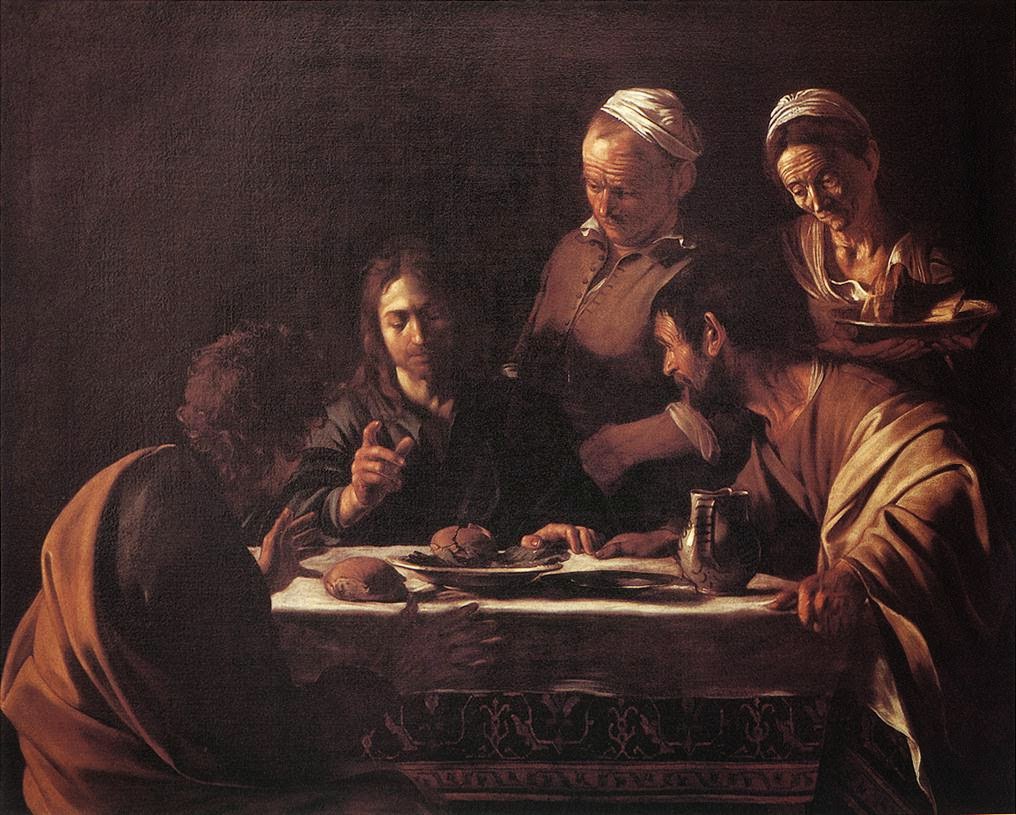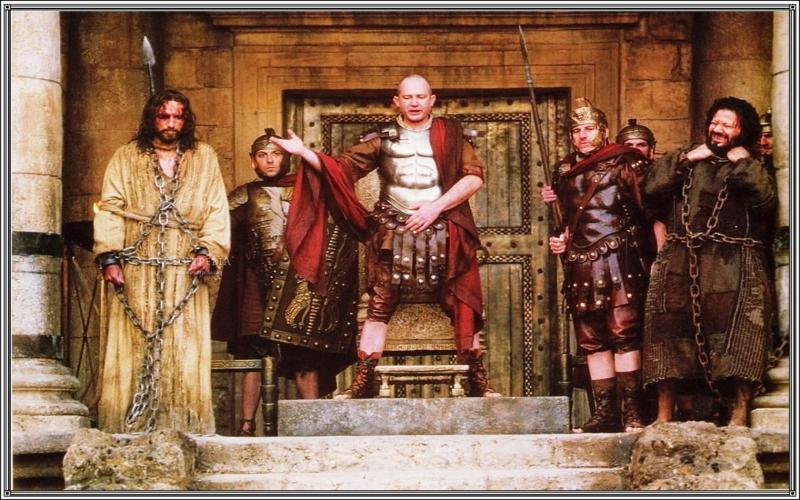
Mass readings for the 3rd Sunday of Easter:
Acts 3.13-15, 17-19 Psalm 4.1, 3, 6, 8 1 John 2.1-5 Luke 24.35-48
We are faced with choices; and there’s a persistent human desire to avoid choices, to “have one’s cake and to eat it too,” to “have it both ways” even when a decision is needed and has real consequences. There is a point at which options close, and the lack of choosing often leads to either the choice being made for us; or worse, a third unanticipated option is taken with horrible results.
The choice we face in history, recurring at moments of crisis usually, is that of Christ or Barabbas; as Saint Peter describes them, the Holy One of God or the murderer. And we’d have to ask, as we do of the crowds who shouted for Jesus to be crucified: how could they choose Barabbas? And yet they did; and we do far too often. The choice between the forces of the light that is peace, justice and truth; and the dark forces of earthly power that are violence, vice and lies ought to be obvious, but so often are not.
As Christians, we may have made our choice so that in the crisis there is resolve and not worry. But with what certainty are we making our choice for Christ – do we know that’s what we’ve actually chosen?
So many of the resurrection stories involve Jesus not being recognized. Would you know him if you met him?
Going back to the crowd shouting at Pontius Pilate as he offered the choice of mercy to one condemned prisoner, there were those who shouted for Jesus, others for Barabbas, and then those who said nothing – they were probably like a lot of us today: unsure of the facts about a lot of things, often relying on rumour, giving us little help in choosing. We can’t let the people of Jerusalem off the hook because of this, at least not completely, but we all must appreciate the circumstances and make allowances for misinformation and disinformation; in this case, disseminated by the powerful who sent their agents to spread lies. I’ll add another layer of confusion onto this: maybe some who were shouting for Barabbas thought they were shouting for Jesus of Nazareth.
There’s a tradition that there was such confusion. Some ancient manuscripts of Matthew’s Gospel tell us that Barabbas had a first name, and that name was Jesus. And if we consider the name “Barabbas” itself, it can be translated from Aramaic into English as “son of the father” – bar, “son of” and abbas, “the father.”
So, on the day of Pilate’s judgement: two men named “Jesus”, one identified as “the son of the father” stood before the crowd. Could those agents of our Lord’s enemies not have used this? We need to remember that many might not have known Jesus of Nazareth to see him, but they may have heard reports of his preaching, his good message, his peaceful ways, and how he referred to God as his father. Based on this, and with chaos all around, wanting to do the right thing and save the man of peace, they shouted “Barabbas!”

So, when Peter rightly says to the Jerusalem crowd, “…you rejected the Holy and Righteous One and asked to have a murderer given to you,” there were some listening who had to admit: we really should have been paying attention to who was really who, given what was at stake – at the least the life of an innocent man.
And today there is so much counterfeit out there in terms of virtue, righteousness, compassion and justice that we need to know better than by rumour, garbled testimony and our own poor recollections of who Christ is; and most certainly when something is not of Christ. No one making an appeal to us as a public, or as individuals, is going to make it in any other terms than those of justice, righteousness, and compassion. I can’t say any politician has the platform of vote for me because I’m evil, cruel, and unjust.
So, what are we going to do, we who are ostensibly disciples of Jesus, believe in the resurrection, and understand that whatever is good about our civilization comes of Christ; and as to the bad of it, well, we know it’s bad because Christ has enlightened us?
Well, let’s consider how Jesus proves who he is to the apostles gathered in the upper room. They are there in today’s gospel listening to the disciples who encountered Jesus on the road to the village of Emmaus. They’ve just heard this story: this fellow started walking with us, asked about the latest news. After we got over the shock that he didn’t know about Jesus’s crucifixion, we told him about all the commotion that arose, and the strange story of the empty tomb. Then this guy began to explain, from the scriptures, the true significance of what had happened; and then we went into an inn to eat, and it was as he offered thanksgiving and broke the bread, we realized it was Jesus himself!
We today can be reasonably certain that some apostles reacted with doubt – “Get out of here! No way!”
Then Jesus shows up, and does the same thing with them. He explains things from the scriptures, and he eats with them: discussion based on God’s holy Word, and table fellowship, breaking bread together – this is how we come to know Christ. We might reduce that to “word and sacrament” and so, it is in the Mass we come to know him. And as central as the Mass is, as important as it is to hear the scriptures, hopefully with a decent homily; as indispensable as the eucharist is; many need something outside the ritual of the Church and a ten-minute reflection on ancient texts whose relevance they wonder about.
In these times of weak faith, of misunderstanding of Christianity, of temptation to seek meaning for one’s life in activism, politics, and indeed, in religious systems of a violent character, it might be a good idea to sit down and break bread, and break open a conversation about the important questions of life, because it’s there that Christ will turn up in a way that people can understand.
In this Easter season we have a lot of children coming for the first communions, for confirmation; and for their families, this is an opportunity for reconnection to a faith that might be on shaky foundations; because it’s based on a children’s catechism that does not speak to the adult situation. One may have fond memories of childhood faith, just as the apostles could sit in the upper room and reminisce about the good times they had with Jesus on the road, but can the risen Christ be believed in? What more mature questions do we have? What is our struggle today to believe?
Again, I extend to anyone here the invitation to come to the Alpha, as a family. Yes, we’re starting at 1 o’clock Sunday with the first lunch, and you’ve plans, plans perhaps to celebrate a first communion. But there’s next week, and you will be welcome. Maybe you’re a single man, or an old married fellow, and honestly, for you, the mass is hard to connect to. The Knights of Columbus are meeting Saturday mornings for coffee and conversation, learning and discussion about what the Risen Lord means for a man today. You’re welcome there too; to pull up a chair, break bread (or donuts), and ask questions, this being one real way Christ is physically present in the world: in his people who are alive in the spirit of the resurrection. Amen.